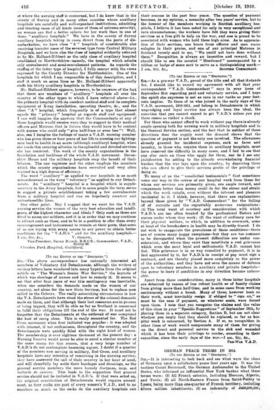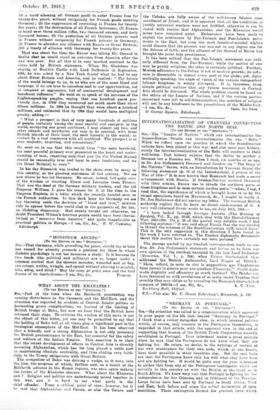GERMAN PEACE TERMS IN 1914.
[To THE EDITOR OF THE " SPECTATOR.")
Sne—It is interesting to look back and see what were the ideas. of Germany upon a satisfactory peace four years ago. It was the tactless Count Bernstorff, the German Ambassador to the United States, who informed an influential New York banker what these terms were: (1) All French colonies, including Morocco, Algeria, and Tunis; (2) all North-Eastern France from Saint-Valfiry to Lyons, being more than one-quarter of French territory, including fifteen million inhabitants; (3) an indemnity of .8400,000,000;
(4) a tariff allowing all German goods to enter France free for twenty-five years, without reciprocity for French goods entering Germany; (5) the suppression of recruiting in France for twenty- five years; (6) the destruction of all French fortresses; (7) France to hand over three million rifles, two thousand cannon, and forty thousand horses; (8) the protection of all German patents used in France without reciprocity for French patents in Germany; (0) France to abandon any alliance with Russia crr Great Britain; (10) a treaty of alliance with Germany for twenty-five years.
That was about the time the Kaiser was telling Mr. Gerard in Berlin that he would stand no nonsense from America after the war was over. But all this is in very marked contrast to the views held by British statesmen. When Mr. Gladstone was staying at Brechin Castle with Lord Dalhousie in September, 1884, he was asked by a New York friend what he had to say about Great Britain and America, and he replied : " The future of the world belongs to us, to us who are of the same blood and language, if we are true to ourselves and to our opportunities, not of conquest or aggression, but of commercial development and beneficent influence." He went on to speak of the increase of the English-speaking peoples, saying that one hundred years pre- viously (i.e., is 1784) they numbered not much more than about fifteen millions. In 1884 he thought they were about a hundred millions, and estimated that by 1984 they would have multiplied greatly, adding :-
" What a prospect is that of very many hundreds of millions of people, certainly am®g the most manful and energetic in the world, occupying one great continent, I may almost say two, and other islands and territories not easy to be counted, with these British islands at their head, the most historic in the world : in contact by a vast commerce with all mankind. The prospect is at once majestic, inspiring, and consolatory."
Ile went on to say that this would, form "the most beneficial, the most peaceful primacy ever presented to the heart and under- standing of man, requiring only that you [in the United States] should be reasonably true and loyal to your traditions, and we [in Great Britain] to ours."
In his day Bismarck was lauded to the skies, even by many in this country, as the greatest statesman of last century. We see now where he has led Germany. He never, indeed, felt quite sure of the wisdom of wresting Alsace and Lorraine from France. That was the deed of the German military leaders, and the old Emperor William. I. gave his reason for it at the time to the Empress Eugfinie, in a letter which she recently handed over to the French authorities. In this dark hour for Germany we see her throwing aside the doctrine of " blood and iron," anxious only to appear before the world clad in the garments of, for her, an ill-fitting democracy. Had events turned out otherwise, no doubt President Wilson's fourteen points would have been charac- terized as "nonsense from America" and quite inapplicable as practical politics in Europe.—I am, Sir, &e., P. W. CAMPBELL.
Edinburgh.



































 Previous page
Previous page